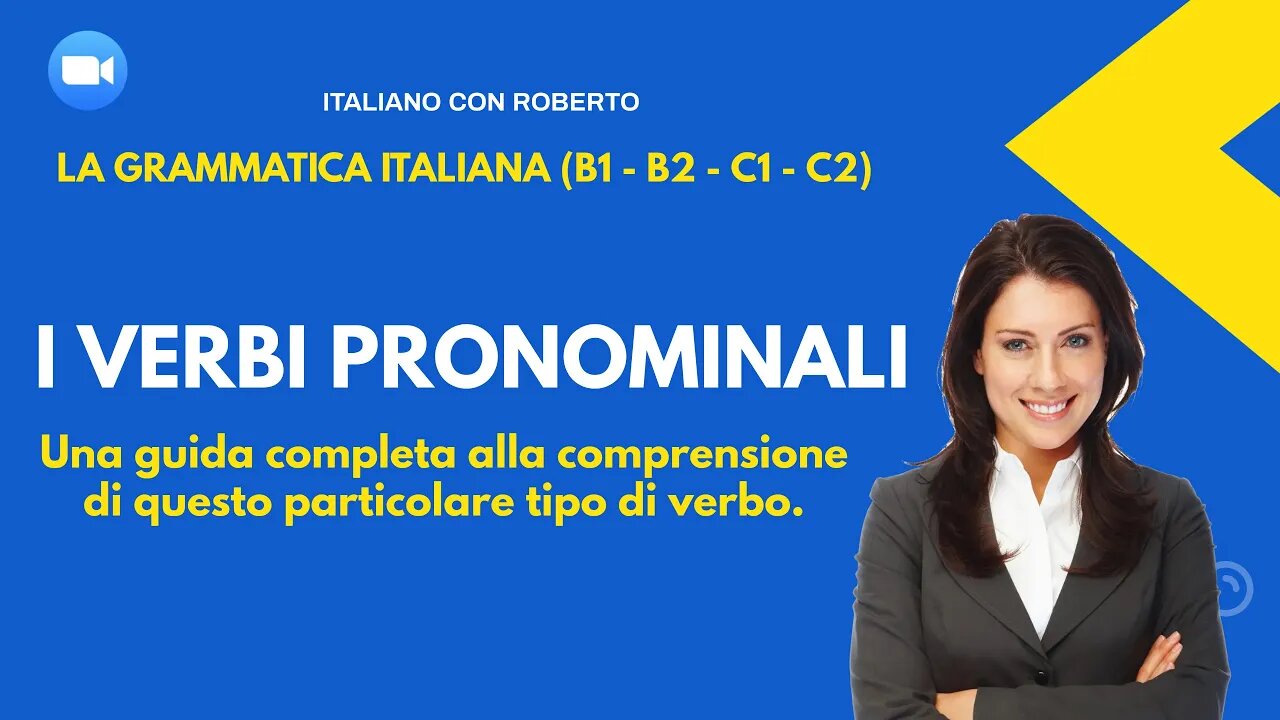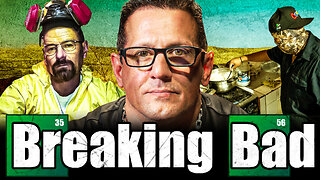Premium Only Content

"Learn pronominal verbs in 5 minutes and boost your confidence in speaking Italian"
#RobertoBorzellinoLinguaitalianaperstranieri.
Pronominal verbs: a comprehensive guide to understanding this particular type of verb.
Pronominal verbs are a particular type of verb that often causes confusion and difficulty in understanding for those studying the Italian language. In this article, we will make a complete guide to pronominal verbs, explaining what they are, how they work, and how they can be used correctly in written and spoken communication.
What is a pronominal verb?
A pronominal verb is a verb that requires the use of a reflexive pronoun (mi, ti, si, ci, vi) to indicate that the action exerted by the verb is directed at the subject itself. For example, the verb "to wash oneself" requires the use of the reflexive pronoun "yes" to indicate that the subject is washing itself. Other examples of pronominal verbs are "to dress," "to comb" and "to wake up."
How do pronominal verbs work? Pronominal verbs are formed by the base verb (e.g., "wash") and the reflexive pronoun (e.g., "yes"). The reflexive pronoun changes depending on the subject of the verb, as shown in the following table:
Reflexive pronoun Subject
Me I
You
Yes He/She
There We
Vi You
Yes Them
In addition, pronominal verbs can be used in different verb forms, such as the imperfect, the near past, and the future. For example, the verb "to wash" can be conjugated as follows:
Verb tense Conjugation
Present I wash myself, you wash yourself, we wash ourselves, you wash yourself, they wash themselves
Imperfect I washed myself, you washed yourself, we washed ourselves, you washed yourselves, they washed themselves
Next Past I washed myself, you washed yourself, he washed himself, we washed ourselves, you washed yourselves, they washed themselves
Future I will wash myself, you will wash yourself, we will wash ourselves, you will wash yourself, they will wash themselves
How to use pronominal verbs?
Pronoun verbs are commonly used in written and spoken communication in Italian. They are often used to express actions that the subject performs on himself, such as "to wash," "to dress," and "to comb." They can also be used idiomatically, such as "arrabbiarsi" (meaning to become angry) and "svegliarsi" (meaning to wake up).
However, it is important to note that the use of pronominal verbs can vary depending on the context and style of communication. For example, in formal texts such as letters and official documents, it is preferable to use non-pronominal verbs to avoid sounding too colloquial.
In addition, it is important to know the rules of pronominal verb usage. For example, the verb "to wash" cannot be used in the passive form (such as "to be washed") because it requires the action of the subject on itself. Also, pronominal verbs cannot be used with other reflexive pronouns, such as "I am washed" (which would be incorrect) instead of "I wash myself."
Another important rule to keep in mind is that some verbs can be used both with and without the reflexive pronoun, but with slightly different meanings. For example, the verb "to dress" means "to wear" when used without the reflexive pronoun, but means "to dress" when used with the reflexive pronoun. Similarly, the verb "get up" means "to get someone else up" without the reflexive pronoun, but means "to get up from sitting or lying down" when used with the reflexive pronoun.
In general, the use of pronominal verbs is important for correct and effective communication in Italian. Knowing the rules of usage and the various verb forms of pronominal verbs can help avoid errors and misunderstandings in communication.
In summary, pronominal verbs are a special type of verb that requires the use of a reflexive pronoun to indicate that the action is addressed to the subject itself. They are commonly used in written and spoken communication in Italian, but it is important to know the rules of usage and the various verb forms to avoid mistakes and misunderstandings.
With this comprehensive guide to pronominal verbs, we hope to have provided readers with a useful resource to improve their knowledge of the Italian language.
The videos in this channel are dedicated to the Italian language and culture. The main topics will be grammar lessons, exercises, dialogues from everyday life, history, geography, fashion, cooking and much more.
My books on Amazon. Level A1/A2 I recommend the following textbooks:
For students of Russian language: https://www.amazon.it/dp/1521583730
For English language students: https://www.amazon.it/dp/1657435474
For students of German language: https://www.amazon.it/dp/B095GJ5WS5
For Chinese language students: https://www.amazon.it/dp/B08YQQWT32
For students of the Brazilian language: https://www.amazon.it/dp/B0B5KVJNJ9
-
 17:11
17:11
MetatronHistory
1 day agoMedieval Christianity in the Historical Context of Power
14.2K4 -
 4:25
4:25
Paul Joseph Watson
1 day agoHe Let Slip More Than Intended
13.6K35 -
 1:34:32
1:34:32
MattMorseTV
1 day ago $30.31 earned🔴Trump's MASSIVE UPDATE.🔴
69.5K95 -
 2:16:21
2:16:21
Side Scrollers Podcast
19 hours agoTwitch has a SERIOUS Problem + Leaflit’s VIRAL Interview + More | Side Scrollers
47K13 -
 21:55
21:55
GritsGG
14 hours agoMega Win Streak On Warzone! Over 4100 Wins on BO6 WZ!
9.33K1 -
 20:22
20:22
The Pascal Show
1 day ago $3.00 earnedARE THEY IGNORING HER?! Is The White House & FBI Ignoring Candace Owens' A**assination Claims?!
34.1K16 -
 1:00:45
1:00:45
TruthStream with Joe and Scott
1 day agoMondays with Matt Geiger from Verity Metals: Gold, Silver, The Housing Market and more. Live 12/1 6pm pacific #519
15.3K1 -
 2:17:46
2:17:46
The Connect: With Johnny Mitchell
3 days ago $14.79 earnedA Sitdown With The Real Walter White: How An Honest Citizen Became A Synthetic Drug Kingpin
85.7K2 -
 2:40:08
2:40:08
PandaSub2000
11 hours agoDEATH BET | Solo Episode 01 (Edited Replay)
10.9K1 -
 LIVE
LIVE
Lofi Girl
3 years agolofi hip hop radio 📚 - beats to relax/study to
536 watching